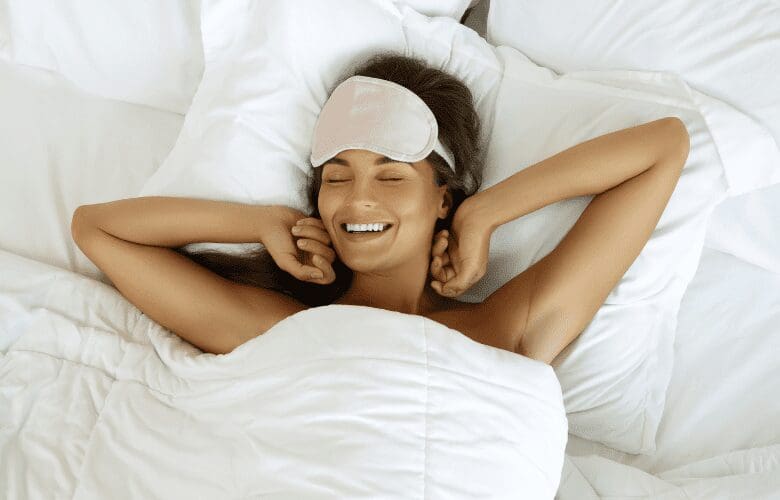7 Simple Yet Powerful Hacks To Enjoy Quality Sleep & Restful Nights
Are you tired of waking up groggy and exhausted, feeling like you’ve barely slept a wink? Many of us face this all-too-familiar battle, and the impact goes far beyond mere annoyance. When sleep eludes you, both your body and mind pay the price. But fret not! There are simple yet powerful steps you can take to reclaim the restful nights you so desperately crave. So let’s dive in and discover how you can wake up feeling refreshed and rejuvenated each morning, ready to conquer the day ahead.
THE IMPORTANCE OF QUALITY SLEEP AND RESTFUL NIGHTS
You may think you’re getting enough sleep in terms of hours, but it’s crucial to consider the quality of your slumber. What happens in those precious hours is what truly counts. Quantity matters, but so does the restfulness of your sleep.
It’s during the deep sleep phase that vital biological processes take place. This phase allows your body and mind to undergo essential restorative processes that contribute to your overall health and wellness, including:
Tissue renewal and repair
While you rest, your body releases growth hormones that promote the healing and regeneration of cells, tissues, and muscles. This is why sleep is vital for recovery after intense physical activity or when nursing an injury.
Consolidation of memories and information
During the deep sleep phase, your brain processes and stores the knowledge and experiences you’ve accumulated throughout the day. This enhances your ability to learn, retain information, and make better decisions.
Immune system regulation
Adequate sleep strengthens your immune system, allowing it to fight off pathogens and keep you healthy. When you’re sleep-deprived, your body’s defense mechanisms become compromised, making you more susceptible to illnesses and infections.
Hormone regulation
While you sleep, your body balances hormone levels, such as cortisol (the stress hormone) and insulin (responsible for blood sugar control). Disruptions in sleep patterns can disrupt this delicate balance, leading to hormone imbalances and potential health issues.
Getting sufficient restful sleep also has a direct impact on your daily life. It uplifts your mood, enhances cognitive function, sparks creativity, and increases productivity. It also equips you with the resilience and mental clarity needed to overcome the day’s obstacles and confidently seize opportunities.
Remember, sleep is an essential component of a healthy and fulfilling life. Embrace the power of quality sleep — your body and mind will thank you for it!
DO WOMEN NEED MORE ZZZs THAN MEN?
Generally, adults need 7-9 hours of sleep each night, although individual requirements may vary. However, recent research suggests that women get less high-quality, uninterrupted sleep.
Well, it turns out there’s a scientific reason behind it. It’s not just a matter of preference or laziness; it’s rooted in our biology.
Women undergo hormonal changes throughout their lives, including monthly cycles, pregnancy, and menopause. These fluctuations directly affect the sleep-wake cycle, controlled by a complex network of hormones. As a result, sleep patterns can be disrupted, necessitating a greater need for quality restorative sleep.
Unlike men, women also rely on various hormones, including insulin and growth hormone, to regulate energy consumption and metabolism. In contrast, testosterone is the predominant hormone in men, responsible for their energy levels, muscle development, and tissue repair. This fundamental difference in hormonal profiles further highlights the unique physiological needs of women.
In addition, women tend to multitask and juggle numerous responsibilities, leading to increased mental and physical exhaustion. So, it’s no surprise that their bodies yearn for more sleep.
Furthermore, women wake up in the middle of the night more often than men, as they are often responsible for caring for others in the household. These sleep disruptions throw off sleep cycles, leaving their bodies needing extra overnight rejuvenation.
So the next time you find yourself longing for more Zzzs, remember it’s not just in your head. Your body is simply asking for the well-deserved rest it needs to function optimally.
7 SIMPLE HACKS TO HELP YOU ACHIEVE QUALITY SLEEP
Now that we understand the importance of sleep quality, let’s delve into straightforward yet impactful strategies that can greatly enhance your sleep. Integrate these 8 tips into your daily routine, and you’ll be well on your way to achieving the restful and rejuvenating sleep you deserve.
1. Keep a consistent sleep schedule.
Consistency is key to a healthy sleep routine. Set a fixed bedtime and wake-up time, even on weekends, to reinforce your body’s natural sleep-wake cycle and enhance sleep quality. By establishing this regular schedule, you can optimize your circadian rhythm and enjoy the benefits of a well-rested and rejuvenated mind and body.
2. Craft a haven for slumber.
Transform your sleep space into a cozy oasis where soft sheets and tranquil colors invite you to drift into dreamland. Consider soft lighting or blackout curtains to create a soothing ambiance. By crafting a haven for sleep, you invite a sense of calmness and serenity, setting the stage for a truly restful and revitalizing night’s rest.
3. Reevaluate your relationship with food.
Mindful eating habits can contribute to better sleep quality. Avoid heavy, greasy meals close to bedtime, as they can disrupt digestion and lead to discomfort. Spicy foods can cause acid reflux and increase body temperature, leading to poor sleep quality. Also, be mindful of caffeine and alcohol intake, which can interfere with sleep patterns.
4. Embrace the pleasure of regular exercise.
Making exercise a part of your routine stimulates your body and mind, releasing pent-up energy and reducing stress levels. Aim for moderate-intensity activities that you enjoy, such as brisk walking, cycling, or yoga. However, avoid exercising too close to bedtime, as it may interfere with falling asleep.
5. Tame the blue light beast.
Blue light emitted by electronic devices like smartphones, tablets, and computers can disrupt your sleep-wake cycle. To mitigate its effects, consider reducing your exposure to screens in the evening, especially within the last hour before bedtime. Dim the brightness on your devices or use blue light filters or glasses and opt for relaxing activities instead.
6. Unwind in the twilight hours.
As the day winds down, it’s crucial to create a relaxing atmosphere that prepares your mind and body for rest. Engage in relaxing activities such as taking a warm bath or listening to gentle music. Avoid stimulating activities that can hinder sleep, such as intense workouts or engaging in stressful discussions.
7. Treat yourself with herbs.
Several herbs are known for their calming and sleep-promoting properties, offering a natural and gentle way to relax before bedtime. A few examples include:
- Chamomile: Renowned for its soothing effects, it can aid in reducing anxiety and promoting deep sleep.
- Valerian root: known for its sedative properties, helps to induce relaxation and improve sleep quality.
- Lavender: can promote tranquility and relieve stress with its delightful fragrance, setting the stage for a peaceful slumber.
Incorporate these herbs into your evening routine, whether through herbal teas, essential oil diffusers, or herbal supplements and experience the wonders they bring to your sleep journey.
CAN ACUPUNCTURE HELP WITH ACHIEVING QUALITY SLEEP?
If you’re struggling with sleep-related issues like insomnia, apnea, or restless legs syndrome, acupuncture could be a game-changer for you. In 1997, the National Institutes of Health (NIH) officially recognized acupuncture as a safe and effective treatment for various conditions, including sleep-related disorders.
Acupuncture stimulates the release of endorphins, natural chemicals that promote relaxation and alleviate pain. This not only helps you unwind but also makes it easier for you to fall asleep and stay asleep throughout the night.
Not only that, but acupuncture can also regulate the flow of energy in your body, known as Qi. By addressing any imbalances that might be disrupting your sleep, acupuncture helps you achieve a more restful and refreshing slumber.
Moreover, acupuncture also amplifies melatonin production, harmonizing your sleep-wake cycles. It also enhances blood circulation, targeting key points in sleep-regulating regions in the brain and guiding you into a peaceful, restorative sleep.
Ultimately, acupuncture is about promoting your overall well-being, which includes getting
quality sleep. By seeking acupuncture treatment, you’re giving yourself the opportunity to experience the profound benefits it offers for sleep-related issues.
The Bottom Line
If you’re longing for restful nights, making small adjustments to your bedtime routine can make a big difference. But if you’ve tried everything and still find yourself tossing and turning, acupuncture might be worth exploring. If you’re unsure or have doubts about acupuncture, consider reaching out to a licensed acupuncturist. They can help address any lingering questions or concerns you may have and provide personalized support tailored to the underlying causes of your sleep issues. Remember, prioritizing your well-being includes prioritizing your sleep!












